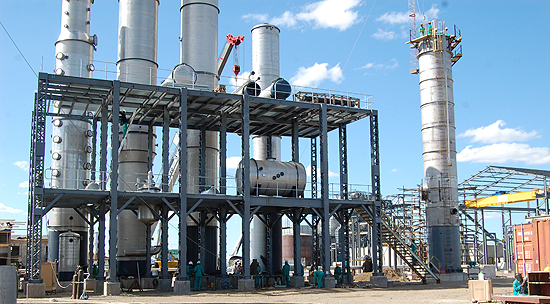
The Sunday Mail

 Faith Mhandu and Kuda Bwititi
Faith Mhandu and Kuda Bwititi
In a major turn of events that is likely to see Government reconsider its policy position on the Chisumbanje Ethanol Plant in Chipinge, business mogul Mr Conrad “Billy” Rautenbach is said to have misled authorities into believing that the project cost US$600 million to establish when it is worth is no more than US$60 million.
This blatant misinformation led Government, through the Agriculture Rural Development Authority (Arda), to commit itself to partnering Mr Rautenbech’s company, Madcom Investments, under the Green Fuel joint venture company, which enjoyed ethanol production monopoly between August and December last year.
Spirited calls are now being made for the company to immediately comply with the country’s indigenisation regulations stipulating a 51-49 percent shareholding between locals and foreign-owned businesses.
The State invested US$36,7 million – the value of land and immovable assets – into the project. An independent evaluator, according to Green Fuel, put the value of the land spanning over 30 000 hectares at US$17, 6 million; immovable assets at US$12, 9 million and asset equity at US$6, 1 million.
Madcom Investments claims Government’s investment accounts for only 10 percent shareholding in the company.
However, the latest revelation pegging the cumulative plant cost at US$60 million automatically makes Government the majority shareholder, meaning Green Fuel now needs to synchronise its documentation with this shareholding.
Outspoken Zanu-PF Mashonaland West provincial chairman Mr Temba Mliswa told The Sunday Mail last week that Energy and Power Development Minister Dzikamai Mavhaire revealed at a recent party caucus that Mr Rautenbach lied to Government that the Chisumbanje plant was worth US$600 million.
Mr Mliswa said the minister told the gathering that the project was, in fact, worth US$60 million, leading to spirited calls for Green Fuel to immediately comply with indigenisation requirements.
Mr Mliswa, who claims to have helped Mr Rautenbach secure the lucrative ethanol production deal, questioned the monopoly initially accorded the company, saying its failure to meet market demand raised eyebrows.
Contacted for comment, Minister Mavhaire requested written questions, which were subsequently sent to his office.
After the responses appeared to take long in coming, this news crew telephoned the minister who retorted, “If my secretaries do not have the response, then there is no response for you.”
Mr Mliswa – based on information from the minister – maintained that the ethanol plant was pegged way above its true value. He said the second-hand material used to construct part of the plant meant that the project could not be worth US$600 million.
“Minister Mavhaire recently revealed to a Zanu-PF caucus meeting that the plant was only worth US$60 million and that the Government’s contribution could afford it a 51 percent stake that they had initially agreed on.
“The project was initially said to be worth US$600 million. It was later reviewed to US$400 million, which is good reason why people should question the authenticity of the figures. Investigations should be carried out and find out the type of equipment that was imported since the Zimbabwe Revenue Authority keeps records on imports and exports.
“The company imported second-hand equipment from Brazil which cannot be worth that much. There are a lot of things which are amiss in the deal; even the issue of Green Fuel enjoying a monopoly on ethanol despite the fact that their fuel costs over US$1, which is more expensive than that of Triangle, which only costs $0,60.”
Green Fuel assistant general manager Mr Raphael Zuze said the company never pegged the project cost at US$600 million but US$300 million.
Mr Zuze said US$600 million represents the estimated total investment value, which also includes the setting up of two additional plants and construction of a new dam, among other infrastructure development projects.
He added that 40 percent of the plant equipment was imported from Brazil and the remainder manufactured locally.
“We never stated that a single plant costs US$600 million. It was an approximate figure that was being said in the media taking cognisance of how much the entire project would cost once it was fully implemented.
“The figure that we have invested into the plant that we have already constructed here at Chisumbanje is US$300 million.
“However, the cost of the total investment that we intend to pour in is very huge.
“We are only still at the first phase and we now plan to go into the second phase of constructing another plant. The other phases will involve the construction of a third ethanol plant and Condo dam, to add to infrastructural development that comes with such huge projects.”
Mr Zuze said outside of the plant cost, the total investment would also include the setting up of irrigation facilities that cover 1 000 hectares of land belonging to villagers displaced by the project.
Other costs cover the extensive rehabilitation of defunct infrastructure at the Arda estate as well as equipment maintenance.
He said Green Fuel no longer had ethanol production monopoly as Triangle Estates was also producing the bio-fuel.
Green Fuel began running Chisumbanje Ethanol Plant in 2009 as Government sought to reduce fuel import expenses, ensure supply security and create employment in line with the National Energy Policy.
Operations were, however, halted in February 2012 after the then Energy and Power Development Minister, Mr Elton Mangoma, refused to facilitate mandatory ethanol blending, arguing the move would only benefit a few.
More than 4 000 plant workers were put out of employment while Green Fuel remained with ethanol stocks of 10 million litres.
Production only resumed last August following the proclamation of Statutory Instrument 17 of 2013, which introduced mandatory blending.
The blending ratio began at E5 — 5 percent ethanol and 95 percent petrol.
The ratio doubled and later rose to 15 percent.
It was, however, cut back to 10 percent after the sole ethanol producer — Green Fuel — failed to meet market demand.
Triangle Estates was eventually licensed to help satisfy this demand.



